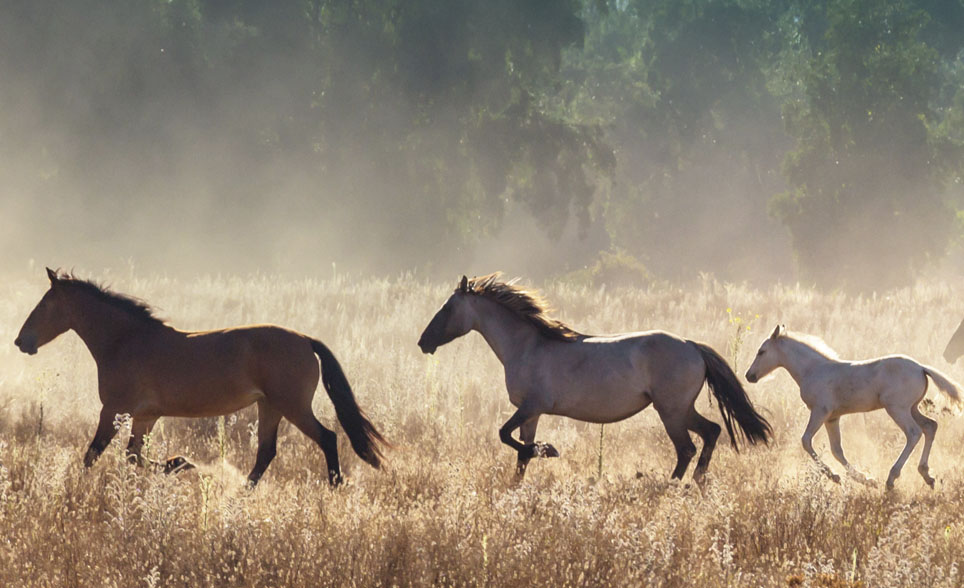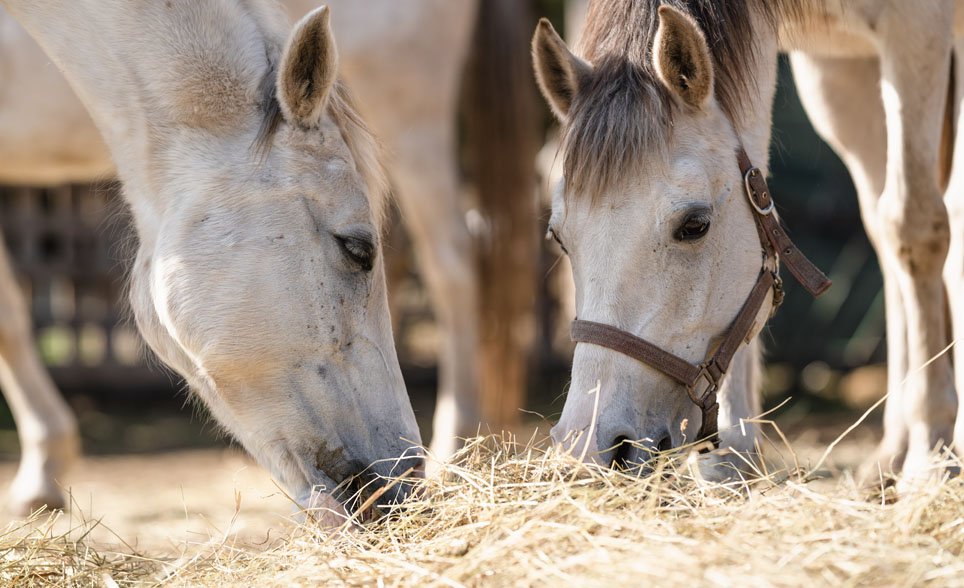
Horse Feeding - Freedom to Graze
The horse feeding industry is a big money business but in many cases it is not based on the natural requirements (or best interest) of the horse.
Horses are foragers/grazers who in the wild, would travel over great distances to obtain food and water as the wild grasses are low in nutrition. In it's natural environment the horse grazes for approximately 18-20 hours per day. The relatively small stomach and large gut are perfectly suited for this. If the stomach is left empty for prolonged periods (as often happens with stabled horses) the stomach lining can become damaged.

The majority of food digestion takes place by bacteria in the large intestine. These bacteria continually reproduce and are kept at appropriate levels by the movement of the gut contents. If the food intake is reduced then the bacteria levels become out of balance which could result in colic.
Also as there are different types of bacteria needed for processing different food substances so sudden changes in diet can cause gut disturbances and lead to colic.
Grain is not easily digested by the horse as it did not encounter it in the wild so the digestive system is not evolved to cope with it.
Therefore the most appropriate diet to feed to a horse is grass or grass hay on a free choice basis. However, due to current farming practices which aim to increase the nutritional value of pasture grasses, many fields are now too rich for safe grazing (see Safer Grass website for more information on this).
This means that you may have to restrict the amount of grass available to your horse - see ideas on how to do this on the 'Paddock Paradise' page) to prevent illnesses such as laminitis which can be triggered by high levels of sugar in the grass.
Hay is a much safer alternative to be used when horse feeding and it can also be soaked in clean, warm water for 30 minutes (or for an hour in cold water) before feeding to further reduce the sugar levels if necessary. Using a slow feeder for your hay will also help regulate consumption.
Best horse feeding position

The horse's body has evolved to work most efficiently when eating at ground height. When a horse puts it's head down to eat the lower jaw drops forward and then when the horse lifts it's head to chew the jaw slides back. This forward and backward motion helps to grind the teeth and keep them at the optimum length.
This does not occur when the
horse is fed with it's head off the ground from a hay net or rack. This
is why it is important to provide food at ground level.
The airway is also designed to work best when the head is held long and low. A high head position puts a bend in the airway which impedes inhaled air. This means that any foreign particles that are inhaled, such as dust from hay, are more likely to hit the walls of the airway and embed in the mucous membranes. This in turn allows germs and viruses to enter the tissues and can lead to immune related illnesses such as heaves (COPD).
The horse's spine is suspended between the withers and is raised and lowered by the tension created through the ligaments when the head is raised and lowered. By feeding from the ground there is less strain on the muscles to maintain a correct posture.
Prehensile Lips
Horses have prehensile lips which enable them to sort through the different plants that they come across when grazing in a natural environment. Prehensile means "to sieze or grasp". In this video you can see Monty, Onyx, Sam and Ben use their lips to move snow aside and then choose specific strands of grass to eat. In the deeper areas of snow they will also paw to move the snow aside. If you look closely you will also see how they spit out any leaves that they dislike.
Return from Horse Feeding to Natural Boarding home page
